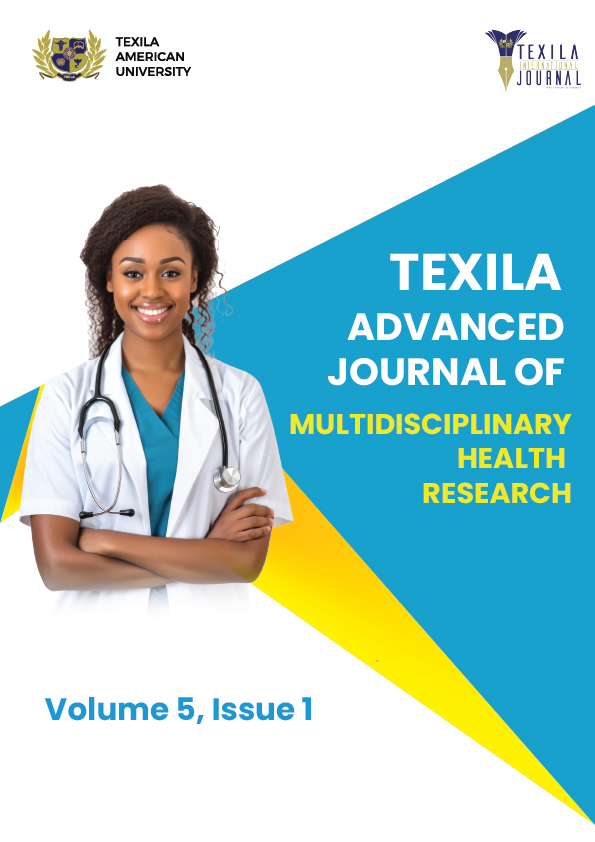[1]. Shen, D., Zhang, M.,
Bhandari, B., Yu, D., 2024, Food additives manufacturing processing for
elderly: advancements, issues, prospective solutions, and future direction. Food Bioprocess Technol, 1–19. Doi:
10.1007/s11947-024-03331-1.
[2]. United
Nations, 2024, World Population Ageing 2023: Challenges and opportunities of
population ageing in the least developed countries. https://doi.org/10.18356/e59eddca-en
[3]. Kingstone,
A., Robinson, L., Booth, H., Knapp, M., and Jagger, C., 2018, MODEM project.
Projections of multi-morbidity in the older population in England to 2035:
estimates from the Population Ageing and Care Simulation (PACSim) model. Age Ageing; 47(3), 374-380. Doi:
10.1093/ageing/afx201.
[4]. Breckner, A., Roth, C.,
Glassen, K., and Wensing, M., 2021, Self-management perspectives of elderly
patients with multimorbidity and practitioners - status, challenges and
further support needed? BMC Family
Practice, 22(1), Article 238. Doi: 10.1186/s12875-021-01584-9.
[5]. Angwenyi,
V., Aantjes, C., Kajumi, M., De Man, J., Criel, B., Bunders-Aelen, J., 2018,
Patients experiences of self-management and strategies for dealing with chronic
conditions in rural Malawi. PLoS ONE,
13(7), e0199977. https://doi.org/10.1371/journal.pone.0199977
[6]. Ofori-Asenso,
R., Chin, K. L., Curtis, A. J., Zomer, E., Zoungas, S., and Liew, D., 2019,
Recent Patterns of Multimorbidity Among Older Adults in High-Income Countries. Population Health Management, 22(2),
127–37. https://doi.org/10.1089/pop.2018.0069
[7]. Johnston,
M. C., Crilly, M., Black, C., Prescott, G. J, Mercer, S. W., 2019, Defining and
measuring multimorbidity: a systematic review of systematic reviews. Eur J Public Health, 29(1),182–9. Doi:
10.1093/eurpub/cky098.
[8]. Khan, M. R., Malik, M.
A., Akhtar, S. N., Yadav, S., and Patel, R., 2022, Multimorbidity and its
associated risk factors among older adults in India. BMC Public Health, 22,
article746. https://doi.org/10.1186/s12889022-13181-1
[9]. Kowal,
P., Kahn, K., Ng, N., Naidoo, N., & Abdullah, S., 2012, Ageing and adult
health status in eight lower-income countries: Sampling design and methods. Global Health Action, 5(1), 1-11.
[10]. Corbett, T., Lee, K.,
Cummings, A., Calman, L., Farrington, N., Lewis, L., Young, A.,
Richardson, A., Foster C., and Bridges, J., 2022, Self-management by older
people living with cancer and multi-morbidity: a qualitative study. Support
Care Cancer, 30, 4823–4833. https://doi.org/10.1007/s00520-022-06892-z
[11]. kou,
S. T., Mair, F. S., Fortin, M., Guthrie, B., Nunes, B. P., Miranda, J. J, Boyd,
C. M., Pati, S., Mtenga, S., Smith, S. M., 2022, Multimorbidity. Nat Rev Dis Primers, 8(1), Article 48. Doi:
10.1038/s41572-022-00376-4.
[12]. Sadeghi, H., Shahbolaghi, F. M.,
Hosseini, M., Fallahi-Khoshknab, M., Harouni, G. G., 2024, Factors associated
with self-management in older adults with multiple chronic conditions: a
qualitative study. Aging and Public Health, 12, https://doi.org/10.3389/fpubh.2024.1412832
[13]. Warner, G., Packer, T. L., Kervin, E.,
Sibbald, K., and Audulv, A., 2019, A systematic review examining whether
community-based self-management programs for older adults with chronic
conditions actively engage participants and teach them patient-oriented
self-management strategies. Patient Educ
Couns, 102, 2162–82. Doi: 10.1016/j.pec.2019.07.002.
[14]. Bayliss,
E. A., Steiner, J. F., Fernald, D. H., Crane, L. A., and Main, D. S., 2014,
Descriptions of barriers to self-care by persons with comorbid chronic
diseases. Annals of Family Medicine,
12(1), 15-22.
[15]. Gobeil-Lavoie,
A. P., Chouinard, M. C., Danish, A., and Hudon, C., 2019, Characteristics of
self-management among patients with complex health needs: a thematic analysis
review. BMJ, 9(5), Article e028344. https://doi.org/10.1136/bmjopen-2018-028344
[16]. Horne,
R., Cooper, V., Gellaitry, G., Date, H. L., & Fisher, M., 2013. Patients'
perceptions of the impact of multimorbidity on their lives: A systematic
review. BMC Family Practice, 14(1),
1-11.
[17]. Wister, A., Li, L.,
Whitmore, C., Ferris, J., Klasa, K., Linkov, I., 202I. A longitudinal analysis
of health behaviors and multimorbidity resilience using the Canadian
Longitudinal Study on Aging. Front Public
Health.1–18. https://doi.org/10.3389/fpubh.2022.896312
[18]. Tugade,
M. M., & Fredrickson, B. L., 2004. Resilient individuals use positive
emotions to bounce back from negative emotional experiences. Journal of
Personality and Social Psychology, 86(3), 320-333.
[19]. Infurna, F., 2021.
Utilizing principles of life-span developmental psychology to study the complexities
of resilience across the adult life span. Gerontologist; 61(6), 807-18. https://doi.org/10.1093/geront/gnab086
[20]. Windle, G., Bennett, K.,
M., MacLeod, C., 2020. The influence of life experiences on the development of
resilience in older people with co-morbid health. Front Med. 7, Article 502314. Doi: 10.3389/fmed.2020.502314.
[21]. Pruchno, R., & Carr,
D., 2017. Successful aging Resilience and beyond. J Gerontol: Series B;72(2),
201–203. https://doi.org/10.1093/geronb/gbw214
[22]. Bandura,
A., 1997. Self-efficacy: The exercise of control. New York: Freeman.
[23]. WHO,
2018. Integrated care for older people: Guidelines on community-level
interventions to manage declines in intrinsic capacity. World Health
Organization.
[24]. Lorig,
K., and Holman, H. R., 2003. Self-management education: History, Definition,
Outcomes, and mechanisms, Annals of
behavioural Medicine; 26, 1–7. doi.org/10.1207/S15324796ABM2601_01L
[25]. Frechette, J., Bitzas, V., Aubry, M., Kilpatrick, K.,
and Lavoie-Tremblay, M., 2020. Capturing Lived Experience: Methodological
Considerations for Interpretive Phenomenological Inquiry. International
Journal of Qualitative Methods; 19, 1–12. Doi:
10.1177/1609406920907254.
[26]. Smith,
J. A., Flowers, P., & Larkin, M., 2009. Interpretative phenomenological
analysis: Theory, method and research. London: Sage.
[27]. Smith,
J. A., 2011. Evaluating the contribution of interpretative phenomenological
analysis: a reply to the commentaries and further development of criteria, Health Psychology Review; 5(1), 55-61, Doi:
10.1080/17437199.2010.541743.
[28]. Eatough, V., and Smith,
J. A., 2006. I feel like a scrambled egg in my head: an idiographic case study
of meaning making and anger using interpretative phenomenological analysis. Psychol Psychother. 79(1), 115-35. Doi:
10.1348/147608305X41100.
[29]. Green, J., and Thorogood, N., 2018. Qualitative
methods for health research (4th ed.), SAGE.
[30]. Alase, A. O., 2016. The impact of the Sarbanes-Oxley Act
(SOX) on small-sized publicly traded companies and their communities.
Northeastern University. https://repository.library.northeastern.edu/files/neu:cj82m2356/fulltext.pdf
[31]. Leung, L., 2015. Validity, reliability, and generalizability
in qualitative research. Journal of
Family Medicine and Primary Care; 4(3), 324–327. Doi:10.4103/2249-4863.161306.
[32]. Creswell, J. W., 2013. Qualitative Inquiry and research
design choosing among five approaches (3rd Ed). Thousand Oaks, CA: Sage
Publications.
[33]. Gunawan, J., 2015. Ensuring trustworthiness in qualitative
research. Belitung Nursing Journal;1(1),
10-11. https://doi.org/ 10.33546/bnj
[34]. Polit,
D. F., and Beck, C. T., 2018. Essentials
of Nursing Research: Appraising Evidence for Nursing Practice, (9th Edition). Philadelphia: Williams
& Wilkins.
[35]. Smith, J. A., Larkin, M., & Flowers, P., 2021. Interpretative phenomenological analysis:
Theory, method and research.
(Seconded.). Sage.
[36]. Miles, M. B., Huberman, A. M., &
Saldana, J., 2014. Qualitative data
analysis: A methods sourcebook (3rd ed.). Sage.
[37]. Cong,
Z., Huo, M., Jiang, X., and Yu, H., 2024.
Factors associated with the level of self-management in elderly patients with
chronic diseases: a pathway analysis. BMC Geriatrics, 24(1), 377. https://doi.org/10.1186/s12877-024-04956-94
[38]. Jäger, M., Lindhardt, M. C., Pedersen, J. R., Dideriksen,
M., Nyberg, M., Bricca, A., Bodter, U., Midtgaard, J., and Skou, S. T., 2022,
Putting the pieces together: A qualitative study exploring perspectives on
self-management and exercise behavior among people living with multimorbidity,
healthcare professionals, relatives, and patient advocates. Journal of multimorbidity and cormorbidity, 12(1), 263355652211001 https://doi.org/10.1177/26335565221100172
[39]. Dines-Griffin, S., Garcia-Cardenas., William,
K., and Bnrimoj, S. I., 2019. Helping patients help themselves: A systematic review of
self-management support strategies in primary health care practice. PLoS one; 14(8), e0220116. https://doi.org/10.1371/journal.pone.0220116
[40]. Salter,
C., Shiner, A., Lenaghan, E., Murdoch, J., Ford, J.A., Winterburn, S., and
Steel, N., 2019. Setting goals with patients living with multimorbidity:
qualitative analysis of general practice consultations. British Journal of General Practice; 69(684), Article e479–e488. https://doi.org/10.3
399/bjgp19X704129
[41]. Paukkonen,
L., Oikarinen, A., Kähkönen, O., and Kaakinen, P., 2022. Patient activation for
self‐management among adult patients with multimorbidity in primary healthcare
settings. Health Science Reports,
5(4), Article e735. Doi:10.1002/hsr2.735.
[42]. Kim,
S., Park, M., and Song, R., 2021. Effects of self-management programs on
behavioral modification among individuals with chronic disease: A systematic
review and meta-analysis of randomized trials. PLoS One; 16(7), Article e0254995. https://doi.org/10.1371/journal.pone.0254995
[43]. Schwarzer,
R., and Hamilton, K., 2020. Changing Behavior Using the Health Action Process
Approach. In: Hagger, M. S., Cameron, L. D., Hamilton, K., Hankonen, N.,
Lintunen, T. eds. The Handbook of
Behavior Change. Cambridge Handbooks in Psychology. Cambridge
University Press; 89-103.
[44]. Lazarus
R. S., Folkman S. Stress, Appraisal, and Coping. Springer
Pub. CO; New York, NY, USA: 1984
[45]. Schuman-Olivier,
Z., Trombka, M., Lovas, A. D., Brewer, A. J., Vago, R. D., Gawande, R., Dunne,
J. P., Lazar, W. S., Loucks, B. E., and Fulwiler, C., 2020. Mindfulness and Behavior Change. Harvard
Review of Psychiatry. 28(6), 371-394. https://doi: 10.1097/HRP.0000000000000277
[46]. Schulman-Green, D., Jaser, S. S.,
Park, C., and Whittemore, R. A., 2016. A Metasynthesis of factors affecting
self-management of chronic illness. J Adv
Nurs; 72(7), 1469-89. https://doi.org/10.1111/jan.12902.


